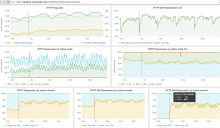Starting at this date, lots of metrics from the ResourceLoader dashboard have gone up significantly.
https://grafana.wikimedia.org/#/dashboard/db/resourceloader
View the last 6 months and zoom in on stuff before August 30 (e.g. July 23 - August 30)
(Note: Before you zoom in you'll find that numbers are much lower before September 7, this is because T111170 got fixed; The old numbers can still be trusted in relation to each other.)
Something big changed. Mainly the HTTP 304 responses. It should be rare for a browser to make a 304 roundtrip for a long-expiry resource. A 1% HTTP 304 hitrate for long-expiry resource may sound bad but is normal and desired. It doesn't mean the browser often hits HTTP 200 for these instead. Rather, it means these requests are never made. (After all, the point of a long-expiry resource is not just that proxies hold on, browsers as well). As such, it is guaranteed that if a browser is in need of a long-expiry resource it either doesn't have it (HTTP 200) or it does have it and it can be used straight out of local cache. HTTP 304 roundtrips don't make sense for long-expiry resources. Yet, starting 2015-07-30 this metric went from <1% to 60%.
To see whether this was caused by a shift in traffic (e.g. requests that were formerly getting HTTP 200, which'd be a good thing), or that they were previously non-existent requests (e.g. requests previously going to local caches). Looking at the total request count (with movingAverage set to 100 to hide daily fluctuation) the answer is clear:
Total traffic went from 1.1M to 1.3M and never came back down. And the ratio of requests expecting a 304 response (If-None-Match) went from 30% to 40% here.



